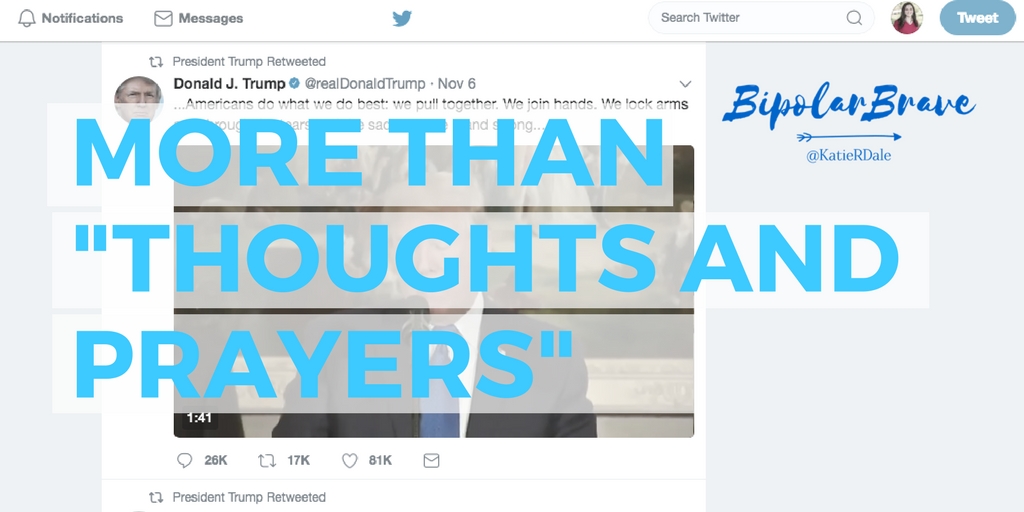So it’s floating around in the news that Mr. President Trump made some remarks about mental illness being a cause of the church massacre on Sunday. I apologize that I am getting into this political topic because I like to stay away from those types of things on this blog, but I can’t be silent when someone with that kind of prominence is making such claims.
So, the question shouldn’t be gun control, legislation, blah, blah, blah. Nor should mental illness be blamed for such heinous and outright intentional crimes. But the question should be, even if it is mental illness, what are we as a nation going to do about it?
So, to help answer that question I invited my good friend, former healthcare administrator and fellow Word Weaver, Dr. John F. Baggett to guest post here on the topic.
When Thoughts and Prayers Are Not Enough
Have you ever noticed the first response of most political leaders to disasters of all kinds. It is almost always to say their thoughts and prayers go out to the victims? We saw it on the news, again and again, after Hurricanes devastated Texas, Florida, and Puerto Rico. We heard it, as well, when fires ravaged California, after the Las Vegas mass murders and the Texas church massacre. Now, as a person of faith, I believe in praying for others, especially those who are hurting and in need of help and comfort. But, as a follower of Jesus, I know thoughts and prayers are not enough.
Jesus did not say “I was hungry and you sent me your thoughts and prayers. I was thirsty and you thought about me, and prayed for me.” He said, ” I was hungry and you gave me food. I was thirsty and you gave me drink.” (Matthew 25:35) Prayer that is not followed by action is, in my view, offensive to God. I think that is also a part of the message of James:
…If a brother or sister is poorly clothed and lacking in daily food, and one of you says to them, ‘Go in peace, be warmed and filled.’ without giving them the things needed for the body, what good is that? (James 2:15-16)
The recent tragic massacre in Texas where a mentally ill person used a gun to kill and wound church members is a case in point. The politicians would have us believe that these mass murders are caused by either mental illness or guns, (but not by a combination) and since they don’t want to have the NRA oppose them in the next election they tend to blame mental illness. But do they really mean it? Or is it just a political dodge? The proof of their hypocrisy is revealed by their actions. Instead of increasing funding for mental health services, they send their “thoughts and prayers” to the victims. And instead of addressing the problem of the availability of guns designed to be used in combat, they call it a mental health problem, and again send their thoughts and prayers to the families of the victims.
We have a mental health crisis in this country. The rare but deadly incidence of mass shootings is just the visible tip of the iceberg. What is a family member, or even a good friend supposed to do if they suspect someone close to them is having a mental health crisis and is either suicidal or homicidal? Every day, desperate persons with mental illness, and their families, seek help from local mental health clinics and from Veteran’s health services, only to be refused treatment, or to be treated briefly and inadequately, and then sent home or out to the streets. Why does this happen? It is a complex problem, but the biggest reason is that mental health services are inadequately funded by Federal, state, and local governments and discriminated against by insurance companies. Because of the limitations on funding, providers are overwhelmed by mental health needs they cannot realistically meet. Not only are services inadequately funded, but research that could produce better pharmacological and psycho-social treatments are also underfunded.
The answer to the public crisis is, however, more than monetary. Our community based treatments tend to follow traditional outpatient and inpatient models when research has demonstrated more effective psycho-social models. One modality that would likely have an immediate impact on the risk of suicide and homicide, including mass murder, would be to have in every county of this nation, mobile interdisciplinary crisis intervention teams with the ability to respond to emergency requests to provide assessment, and both voluntary and involuntary treatment and support. In other words, some existing resources could be redirected from traditional treatment modes to a more effective model of responding to persons going through personal mental health crises.
In my view, we need to address both mental illness and the open access of guns for persons with histories of mental illness and/or domestic abuse. Can better mental health care make a difference? Absolutely! If we are willing to invest resources in mobile crisis intervention teams with the ability to provide both voluntary and involuntary treatment, at least some of these tragedies can be prevented. Can prohibiting “bump stocks” and increasing regulations that make it unlikely a mentally unstable person will be able to purchase a weapon make a difference? Of course it can. It’s time for followers of Jesus to do more than send thoughts and prayers. It’s time to send people to Congress or to state legislatures who have the political courage to do more than send their thoughts and prayers.

What do you think?